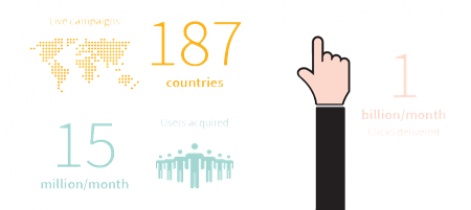Many in the mobile space will remember 2013 as the year of the static App Store and the year when developers around the world began looking abroad for new markets.
Both trends have had an enormous impact on the way developers large and small are handling business in 2014.
Expanding globally is never easy - nor is cracking the top-grossing charts against the budgets of The Big Three.
But there are strategies practices for how to navigate these new waters.
We caught up with Gary Lin from Berlin-based online marketing outfit Glispa at and after GDC to discuss how smart analytics and tracking can help developers make a splash in 2014 and beyond.
Pocket Gamer: As the wild west days of mobile calm down, we're seeing a more sustainable and mature mobile market emerge. What are some of the biggest trends and challenges youve noticed?
Gary Lin: In general, applications/games are getting much better and richer due to computing performance, screen size, faster connectivity and the simple fact that developers have more experience now with mobile's unique capabilities.
This will also equate to an even greater imbalance of top app makers' representation of global app revenue.
The challenge for developers will be the increasing cost of discoverability and cost of user retention through continuous product development.
What are some of the biggest challenges a developer faces when looking toward international marketing campaigns?
In an effort to combat the challenges associated with competition and rising costs, more and more developers are looking at internationalisation at an even earlier stage.

The astounding smartphone and mobile internet adoption rates especially in the BRIC markets offers potentially very cost-efficient marketing opportunities.
The challenges in these emerging countries include a constantly evolving and relatively immature app distribution ecosystem where only a smaller group of marketing companies can offer scale.
Inventory pricing is mostly not install or engagement based and monetisation of users through ad revenue is even more crucial.
What's the biggest mistake a developer can make in looking to launch a game globally?
When it comes to marketing your game on a global scale, developers often underestimate the importance of having proper real-time attribution tracking, sufficient spend power in prioritised markets, and localisation capabilities for both creative and in-game features.
Global game developers need marketing partners that can actually leverage the collected data into their own technology systems, offer a comprehensive set of user acquisition solutions to ensure visibility and scale, and provide local market knowledge and local distribution channels.
At what point in a game's planning should developers integrate analytics?
Building a hit game is as much art as it is science and it is incredibly hard to predict what will motivate certain user actions.
With that being said, the data from player behavior, especially purchases, does not lie.
As not all players are of equal value, the same is true of marketing channels and sources. The sooner marketing analytics can be incorporated, the sooner the essential link between in-game behavior and new user context can be made.
Do you worry that mobile developers are drowning in data that they don't really understand and often isn't actionable?
Analytics for the sake of analysis may reveal some insights that you find interesting but is largely a waste of time.
For marketing purposes, unless the data is statistically significant, associated with relevant user segments and real-time, it will provide little actionable value.
Accurate lifetime value unfortunately is not immediately available or not a relevant metric especially for new game or new market launches. Setting up a diverse enough set of traffic partners, segmenting them as granularly as possible, and dynamically connecting that with near-term ROI indicators is a good start.
2013 saw, as you put it, 'an inflation of games that can monetise well' - what ramifications does this have?
More titles are monetising well simply due to better games and more engaging player experiences.
The rising development costs to produce these games result in many large studios playing it safe by copying proven performers or only leveraging IP on old gameplay. Smaller developers will have little choice but to create more innovative games.
One advantage offered by Glispa is its real-time tracking and optimisation engine - can you explain how this works and what benefits it offers to developers and publishers?
There are so many moving parts to app marketing: ad types and placements, creative messaging, delivery time, in-game features and promotions, competitor activity and ranking...
They are all constantly changing and the only way to achieve maximum results is if you are able to optimise campaigns based on user quality metrics while it is running.
Being able to reallocate budgets across multiple channels and modifying payouts throughout the campaign creates enormous efficiency gains.
What are some strategies for a developer to convert underperforming segments of users?
The first step is to properly identify your user segments based on behavior. We have delivered impressive and very cost-efficient results through our Facebook re-engagement solution.
Other types of monetisation strategies we find interesting are in the area of dynamic in-app pricing and more sophisticated native ad placements. We will be launching a number of innovative products this year to address both retention and monetisation.
You can find out more about what Glispa does via its website.






















